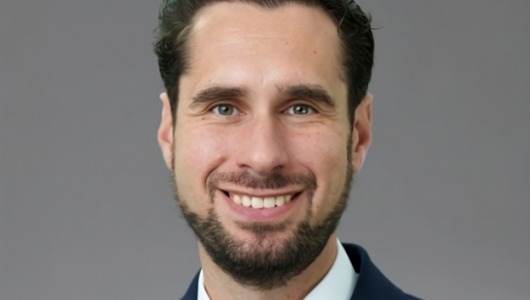“We recently held a unicorn-themed birthday party for my daughter, where we attempted to make unicorn-shaped food.”
It’s a pleasing if unusual start to my conversation with Benchmark Capital chief executive Ed Dymott, which takes place at the head office of parent company Schroders in London Wall — although it does make me wonder how easy it is to shape food into a unicorn.
Dymott also tells me that both his children — Molly, four, and Charlie, two — think he works with trains, because every time they ask where their daddy is, they are told he is on a train. When Dymott outlines his typical week, you can understand where they are coming from.
Globe-trotter
He usually divides his time between Benchmark’s Horsham office and Schroders’ London base. Otherwise, he travels to wherever he is needed, observing “the privilege of working all the way around the world”.
We want to give advisers more time and capacity to do what they do best
Dymott lives in South Croydon, not far from the Money Marketing offices, although he was born in Dulwich and grew up in Surrey. Despite his globe-trotting habits, he finds it amusing that he lives just 10 miles from his birthplace and he works only 15 miles from where he went to school.
Aside from planes and trains, however, Dymott is a big fan of automobiles, which partly influenced his decision to study automotive engineering at Loughborough University in 1997.
A keen follower of Formula 1, Dymott is fascinated by the creativity involved in designing a car and the mechanical aspects of what makes a vehicle go faster.
He has even built a Caterham 7 sports car, which he claims is fully road safe and he has driven. He shows me a picture on his mobile, which displays a car decked out in the colours of his beloved Tottenham Hotspur (Dymott is a proud season-ticket holder).
The underlying reputation of planners is still not where it needs to be
It would be wrong, however, to assume Dymott’s choice of degree was solely down to his love of cars. It also appealed to both sides of his personality.
“My mum was very artistic, and my dad was an analyst and very technical, so I guess I got a combination of both their genes — creative and artistic, but also good with numbers and analytical skills. I am a bit of a hybrid.”
Dymott tells me he is driven by a need to understand what is going on, and by a desire to improve and “never be satisfied with the status quo”.
This has carried over to his professional career, although his university experience persuaded him that he did not want to work in the car industry.
Instead, he joined Fidelity as a graduate in 2000, spending most of his time working on its platform business. In 2008, after eight years at the company, Dymott embarked on an MBA in finance at what was then Cass Business School, part of City University. Still working full time, he fitted in his studies during the evenings and at weekends.
We want advisers to provide the best experience while we work hard in the background
“It made a lot of sense to do an MBA in finance at that time,” says Dymott, even though — as he recalls with a wry smile — the industry was in meltdown due to the financial crisis.
Dymott nonetheless reasoned that most of his colleagues had financial qualifications and, after his time at Fidelity, he could see that his future career was going to be in financial services.
The move to Benchmark
This brings us to Dymott’s current role at Benchmark. He joined the firm as managing director of its wealth business in 2021.
Benchmark was established in 1993 and turned 30 last year. The company has £19bn of assets on its proprietary platform and £6bn in model portfolio solutions on behalf of more than 1,000 financial advisers. It employs over 500 staff.
We are a lot broader than a consolidator. We focus on organic growth
Since 2021, Benchmark has been a wholly owned subsidiary of Schroders, which acquired a 67% stake in the company in 2016 and then bought up the remaining equity over the next five years.
Dymott says Benchmark “gets nothing but support from Schroders”; it is, he points out, extremely well integrated and an important part of the group. He also emphasises the valuable working relationship with his Schroders colleagues.
Wealth management, Dymott claims, is a key strategic focus for Schroders, whose investment in Benchmark enabled it to grow its presence in the financial-planning market and associated it with a business that had “technology credentials”.
Dymott further notes the strength that sits behind the Schroders name, explaining that “the transparency of a listed FTSE 100 company is fantastic”.
He is particularly impressed that the Schroders family still owns 46% of the company, and that the business has a clear long-term focus — specifically around multi-generational planning, which aligns well with the financial sector.
These are not firms just wanting to be bought. These are firms that see the benefits of our service
A typical adviser, he says, works with a client over 10, 20 or 30 years, or even a lifetime, so the spotlight is “not only on one generation but also on the next”.
Dymott became CEO of Benchmark on 1 January 2024, after three years at the company. When I ask him if moving into the new role has been a notable change, he explains that it would have been odd if he had suddenly imposed a new strategy because of his promotion.
“There is a familiarity with the business; so, when you step up to a new role within the existing firm, there is a continuation of what we have been doing over the past three years.”
Overall, he regards Benchmark as a company that provides “an integrated, digitally enabled solution for high-quality financial planners”; one that offers all the tools, services and support a planner needs with which to run their business.
“Our golden aim,” says Dymott, “has always been, and continues to be, to provide all that in one place.”
Growing and expanding
Benchmark has purchased numerous advice businesses over the past few years and has recently enjoyed its best-ever year for attracting and bringing on new advisers.
However, Dymott is keen to highlight the difference between Benchmark and a consolidator, stressing the company’s continued focus on organic growth.
It is about how you use technology and drive processing in the right way
“We are a lot broader than a consolidator,” he says, pointing out that, whenever Benchmark buys another independent financial adviser, it has already worked with that IFA for a defined period.
Additionally, when it takes a stake in a company, Dymott or another representative automatically becomes a non-executive director (NED).
Dymott himself is a NED for several advice firms, such as Finura in London, Kellands in Bristol, and Robert Baxter in Huddersfield.
He points out that most of Benchmark’s efforts are directed towards supporting these firms in their day-to-day activity.
“These are not firms just wanting to be bought,” he says of the 30-plus businesses that joined the Benchmark network in 2023.
“These are firms that see the benefits of our service.”
Dymott believes that Benchmark’s record year is the result of three factors.
The first is Benchmark’s strategy of taking on firms from other networks because “they see us as a better home for their long-term growth”.
The second is directly authorised companies joining Benchmark’s network because they are looking for a more integrated solution.
Our golden aim has always been, and continues to be, to provide everything an adviser needs in one place
The third is what Dymott calls the breakaway adviser segment. This, he claims, is an “interesting market” and a big growth area for Benchmark. It largely consists of planners who may never have run a business themselves but nevertheless want to do their own thing.
“About 12 months ago we bought a business called Oculus Wealth,” says Dymott, by way of example. “It is primarily focused on the breakaway segment — really helping advisers who want to set up their own practice.”
Increasing productivity
Based on the extensive amount of time Dymott has spent with advisers and observing the sector, it’s become clear to him that an increase in productivity is what the market desires the most.
Advisers’ frustration is born out of the “tools and technology they need to work with”, so Benchmark is spending a lot of its capacity on improving this situation.
“Ultimately, we want to enable advisers to do what they do best, and give them more time and capacity to work with their clients. We want them to provide the best experience while we work hard in the background.”
Dymott says he recently spoke to a planner who, having joined the Benchmark network several years ago, felt he could not grow his financial-planning business any further and was thinking of selling it.
Benchmark gets nothing but support from Schroders
However, that business has approximately quadrupled in size over the past few years without adding any more people.
“It is just about how you use technology and drive processing in the right way,” says Dymott.
“That productivity focus is really important to us.”
As our interview draws to a close, Dymott ponders the future shape of financial advice.
The most vital aspect, he claims, is “how we continue to develop professional standards, which is really important to us”.
He continues: “If chartered status has become the standard, the question is where you go next in terms of developing the capability of our financial planners.
It would have been odd if I had suddenly imposed a new strategy because of my promotion
“I think the underlying reputation of planners is still not where it needs to be. So, if we can continue to raise the bar for the profession, it will not only be good for individual financial planners but it will be good for the long-term sustainability of this industry.”
We say our goodbyes and I exit Schroders’ offices, heading for the nearest tube station.
As I board the train — Dymott’s favourite mode of transport — a whimsical notion strikes me; one that would probably appeal to his children. Maybe the ‘Unicorn Line’ would be a fitting name for the next new route on the London Underground.
Snapshot CV
February 2021–present: Managing director, then CEO, Benchmark Capital
2018–20: Managing director, strategy and transformation, Aegon UK
2000–17: Head of business development and strategy, Fidelity
Family: Married to Becky, with a son and daughter
Hobbies: Travelling, music, sport, food, days out with the children
Favourite book: The Midnight Library, by Matt Haig
Favourite film: Eternal Sunshine of the Spotless Mind
Favourite meal: A great steak!
This article featured in the June 2024 edition of Money Marketing.
If you would like to subscribe to the monthly magazine, please click here.
















Comments